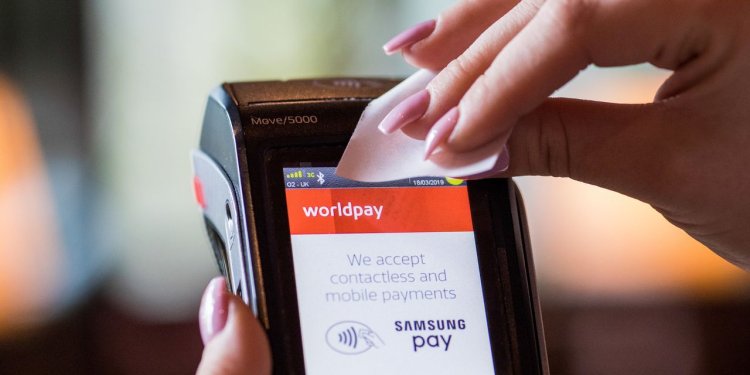FIS to Sell Majority Stake in Worldpay for $11.7 Billion
Private-equity firm GTCR to hold 55% stake following deal that values the payment processor at $18.5 billion Fidelity in 2019 paid around $35 billion to acquire Worldpay, which facilitates payments for retailers and other sellers. Photo: Jason Alden/Bloomberg News By Ben Dummett and AnnaMaria Andriotis Updated July 6, 2023 1:08 pm ET Fidelity National Information Services has agreed to sell a majority stake in its Worldpay Merchant Solutions segment to private-equity firm GTCR for nearly $12 billion, retreating from a big acquisition it made four years ago that quickly soured. Fidelity National, better known as FIS, said Thursday that the deal values the entire payment-processing business at a so-called enterprise value of a


Fidelity in 2019 paid around $35 billion to acquire Worldpay, which facilitates payments for retailers and other sellers.
Photo: Jason Alden/Bloomberg News
Fidelity National Information Services has agreed to sell a majority stake in its Worldpay Merchant Solutions segment to private-equity firm GTCR for nearly $12 billion, retreating from a big acquisition it made four years ago that quickly soured.
Fidelity National, better known as FIS, said Thursday that the deal values the entire payment-processing business at a so-called enterprise value of around $18.5 billion—less than half the $43 billion valuation it acquired Worldpay for in 2019.
FIS said it would retain a non-controlling 45% stake in a stand-alone joint venture and receive upfront proceeds of $11.7 billion, which will be used to pay down debt and return additional capital to shareholders via buybacks.
FIS is a provider of data and technology services to banks and other financial institutions. Its software and services are involved in everyday financial activities, like when consumers check their bank-account balances. Worldpay is among the largest payment processors, helping merchants accept card payments.
FIS made a big bet on the merchant-payments market in 2019 when it acquired Worldpay. The vision behind the deal was to create a global giant in payments and back-office financial services in a bid to reach more customers as transactions increasingly move online.
When the deal was announced, the companies said that it would allow them to cross-sell services to each other’s clients and that they expected significant cost and revenue benefits.
Instead, Worldpay has suffered from shrinking profit margins and underwhelming revenue growth, challenged by increased competition from other payment-service providers including Fiserv’s Clover, Block’s Square, Toast, and all-in-one digital-commerce platforms like Shopify.
Shifts to online and card-based payments over cash since the pandemic have given a boost to many payment processors, but Worldpay’s growth—particularly with small and midsize businesses, or SMBs—was stunted.
FIS works with big merchants like Kroger and Walmart,
but many of its recent challenges have been with SMBs that have gravitated toward Worldpay’s competitors. FIS said last year that its SMB portfolio was seeing “significant changes,” citing “structural shifts in the industry” since the pandemic.FIS shares have fallen by more than 50% since its acquisition of Worldpay closed in 2019, shrinking its market capitalization to about $35 billion.
In February, Jacksonville, Fla.-based FIS announced a $17.6 billion noncash goodwill-impairment charge against the payments-processing business because of the division’s slowing growth outlook, an effective acknowledgment of the failure of the Worldpay deal.
Under pressure from activist hedge funds D.E. Shaw and Jana Partners, the company previously said that it would spin off the payments-processing business.
As a stand-alone company, FIS said it would be able to better focus on the specific needs of global and local banks. Worldpay, meanwhile, would benefit from having greater opportunities to seek acquisitions and other investments in areas such as e-commerce.
—Dean Seal contributed to this article.
Write to Ben Dummett at [email protected] and AnnaMaria Andriotis at [email protected]
What's Your Reaction?













